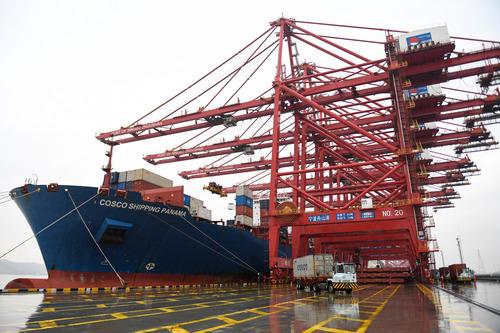BEIJING, March 18 (Xinhua) -- Major ports in China continue to see increases in throughput during last week as the economic activities keep picking up pace, according to the latest data from the China Ports & Harbors Association (CPHA).
From March 9 to 15, the container throughput of top 8 coastal ports in China increased 2.6 percent on a weekly basis, with Dalian and Ningbo recording more than ten percent growth.
During the same period, coal throughput at Chinese major ports grew 17.1 percent from the previous week, as the rising electricity demand pushed up for coal consumption. The daily coal consumption of China's top 6 coastal power plants rose to 556,000 tonnes last week, up six percent from the previous week, and the daily coal shipping volume of Datong-Qinhuangdao line, the major railway line for coal transportation, rose to one million tonnes, an increase of 20 percent from the average level in February.
As crude oil traders adjusted their purchase plans due to the novel coronavirus (COVID-19) epidemic, the crude oil imports loaded at major Chinese ports dropped 10.9 percent from the previous week. With the tumbling of international oil prices, Chinese companies are expected to import more crude oil in the following weeks.
Last week, metal ore throughput of major Chinese ports decreased 7.7 percent week on week. However, with demands for steel and iron ore recovering, daily throughput of metal ore in major Chinese ports reached 3.01 million tonnes last week, recovering to the level at the end of 2019.
In order to reduce the impact from the epidemic outbreak and improve services, Chinese ports are expanding service scope, such as opening up new routes for customers.
At present, Guangzhou port has opened five new international routes, and Tianjin port has launched direct lines to north Europe. (Contributed by Wu Congsi, Cao Jie)




 A single purchase
A single purchase









